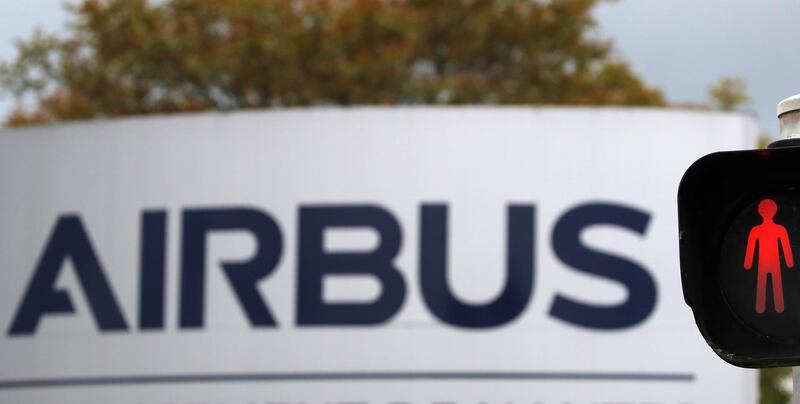European plane maker Airbus has told its 135,000 employees that deeper job cuts are possible and that its survival is at stake without immediate action during the pandemic.
In a letter to staff late last week, chief executive Guillaume Faury said Airbus was "bleeding cash at an unprecedented speed".
Mr Faury said a recent drop of at least a third in production did not reflect the worst-case scenario and would be kept under review.
Airbus said it did not comment on internal communications.
Shares in Europe's largest aerospace group closed down 2.4 per cent on Monday after notching up the biggest falls on the Paris CAC40 index.
Aviation commentator Howard Wheeldon said the letter showed the "realisation of there being little prospect of a large-scale order recovery any time soon".
It was sent to employees days before Airbus is due to give first-quarter results, overshadowed by a pandemic that has left airlines struggling to survive and virtually halted deliveries since mid-March.
Airbus has begun implementing government-assisted furlough schemes starting with 3,000 workers in France.
"But we may now need to plan for more far-reaching measures," Mr Faury said. "The survival of Airbus is in question if we don't act now."
On Monday, Airbus sent 3,200 staff at its Broughton factory in Wales on furlough.
Pressure to send workers home has been partly driven by a stockpile of wings built to cater for disruption from Britain's exit from the EU.
Industry sources have said a restructuring plan similar to the company's 2007 Power8, in which 10,000 jobs were cut, could be launched in the summer.
But Mr Faury said Airbus was already exploring "all options" while waiting for clarity on demand.
Insiders say Airbus is also in talks with European governments about tapping into schemes to assist struggling industries, including billions of dollars worth of state-guaranteed loans.
It has also lent its weight to calls for airlines such as Virgin Atlantic to be bailed out, believing that manufacturing aid would only defer the problem unless airlines survived.
This month Airbus expanded commercial credit lines, buying what Mr Faury's letter called "time to adapt and resize".
French union officials said they were preparing for a major restructure in the summer and pledged to defend jobs.
To stem the outflow of cash, Airbus this month said it would cut narrow-body jet production by a third to 40 jets a month.
It issued targets for wide-body jets, implying cuts of up to 42 per cent from previously published rates.
"In other words, in just a couple of weeks we have lost roughly one third of our business," Mr Faury wrote.
"And frankly, that's not even the worst-case scenario."
Early in April Airbus was looking at options that included halving production.
Analysts say US rival Boeing is expected to announce similar cuts and lay-offs this week, lowering its monthly 787 production to as few as six jets.
Boeing's balance sheet was already weakened by the year-long grounding of its 737 Max.
On Saturday it scrapped a $4.2 billion (Dh15.43bn) tie-up with Brazil's Embraer in a move considered to be caused by the crisis, although Boeing said it was for contractual reasons.
Mr Faury said the Airbus production plan would remain for as long as it took to make a more thorough assessment of demand, probably between two and three months.
He said it was too early to judge the recovery but options included a short, deep crisis with a fast rebound, and a longer, more painful downturn with previous demand levels returning after five or 10 years.
Analysts and airlines have so far mostly spoken of a downturn lasting no more than three to four years.
"Unfortunately, the aviation industry will emerge into this new world very much weaker and more vulnerable than we went into it," Mr Faury wrote.







